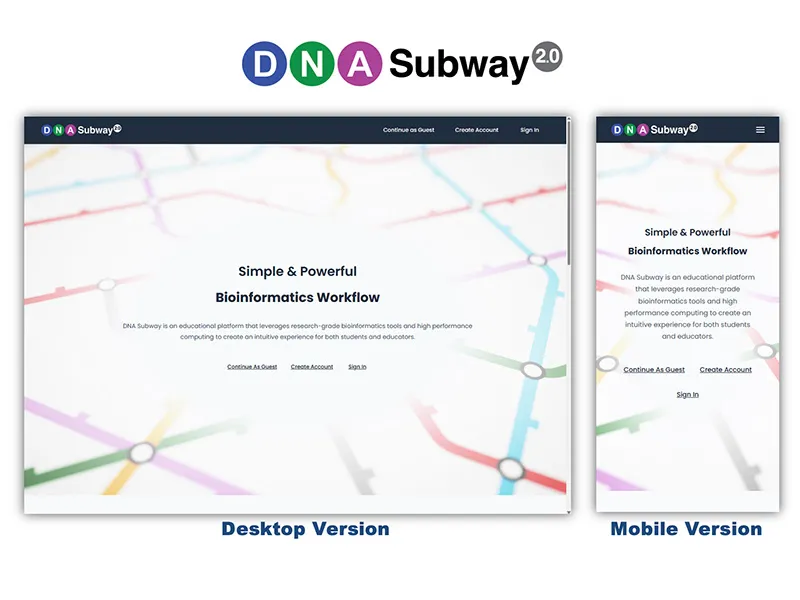
Educator Training
We offer up-to-date teacher training through biology workshops and professional development for teachers in genetics and biotechnology. With federal and private foundation funding, we offer these free workshops to middle school, high school, and college educators, especially those in the areas of genetics, biology, genomics, and bioinformatics.
The Cold Spring Harbor Laboratory DNA Learning Center is an approved Sponsor of Continuing Teacher and Leader Education (CTLE).
Virtual
DNA Subway 2.0 Educator Webinar
With the legacy platform retiring in June 2025, this workshop guides educators through the essential transition to DNA Subway 2.0. We will conduct a live walkthrough of the new mobile-first interface, demonstrate the expanded Blue Line capabilities for Oxford Nanopore sequencing, and cover the practical steps for migrating your curriculum. Join us to ensure your lab materials are updated and ready for the next academic year.
Join Jason Williams on February 24th for a live, virtual demonstration of DNA Subway 2.0, with a walk-through of the new interface, enhanced Blue Line analysis tools, and more. This is your chance to ask questions, troubleshoot, and receive personalized guidance on how to integrate DNA Subway 2.0 into your teaching.
The session will cover the same material, sign up for the most suitable date and time.
Virtual free workshops:
- Each session will cover the same material, sign up for the most suitable date and time below
- Tuesday, February 24, 2026
7:00 p.m.–8:00 p.m. Eastern Time - A Zoom link will be provided to participants after registration

Past Event
Teacher Professional Development in Genetics and Biotechnology
Restriction Analysis and Bacterial Transformation
Monday, January 26, 2026
9:30 a.m.–3:00 p.m.
DNA Learning Center NYC at City Tech
Brooklyn, NY
Join us as we review two classic biology experiments!
Bacterial Transformation
Bacterial transformation illustrates the direct link between an organism's genetics (genotype) and its observable characteristics (phenotype), and demonstrates how genetic engineering is used to produce human proteins such as insulin. In this lab you will introduce genes for antibiotic resistance and fluorescence into the bacterium E. coli. Following overnight incubation, transformed bacteria can be compared to control bacteria for their ability to grow in the presence of ampicillin and glow when exposed to UV light.
DNA Restriction Analysis
The DNA Restriction Analysis lab demonstrates that DNA can be precisely manipulated and that it behaves as predicted by the Watson-Crick structure. You will use restriction enzymes, the scissors of molecular biologists, to cut bacteriophage lambda DNA. The resulting DNA fragments will then be analyzed by agarose gel electrophoresis. Through comparison of DNA digest patterns and restriction maps, you will be able to identify a “mystery” enzyme.
These experiments directly correlate with lab requirements for AP Biology courses and align with the New York State Science Learning Standards, with an emphasis on analyzing and interpreting data, planning and carrying out investigations and the structure and function relationship. Guided by an experienced DNALC educator, training will focus on lab skills and conceptual connections.
There is no charge to attend. Participants may receive CTLE hours, if requested. Teachers will then be eligible to rent a footlocker kit from the DNA Learning Center to teach these labs in their classroom.
In-person free workshops:
- Monday, January 26, 2026
- 9:30 a.m.–3:00 p.m.
- DNA Learning Center NYC at City Tech
62 Tillary Street, Brooklyn, NY 11201 - Directions
Past Event
Teacher Professional Development in Genetics and Biotechnology
Harlem: Forensic DNA Analysis
Monday, January 26, 2026
9:30 a.m.–3:00 p.m.
Harlem DNA Lab
East Harlem, NY
This professional development will focus on the genetic components of forensic science. We will explore two of the key forensic DNA analysis techniques that paved the way for modern forensics and the Combined DNA Index System (CODIS).
DNA Fingerprinting
Human DNA is more alike than different, so how do we find the differences? Restriction enzymes are proteins that recognize specific DNA sequences and can be used to determine whether a particular DNA sequence is present. In this lab, DNA from “evidence” and “suspects” will be compared using restriction enzyme digestion and agarose gel electrophoresis. DNA analysis will then be combined with crime scene data to draw conclusions about each suspect. This is a recreation of the first forensic DNA technique, Restriction Fragment Length Polymorphism (RFLP) analysis.
Forensic DNA Profiling
This lab examines a highly variable tandem repeat polymorphism on chromosome 1 called D1S80, similar to what the FBI uses to create a genetic profile. Participants will prepare a sample of their own DNA from cells obtained by a cheek swab. After amplification by PCR, the participants will identify their genotype with a DNA chip, as well as the traditional agarose gel electrophoresis. Participation in this lab requires a signed consent form to analyze participant DNA.
All teachers are welcome to join this course to learn about different elements of our genome and how DNA can be used for identification. There will be direct classroom applications for teachers of forensics and life science. Guided by an experienced DNALC educator, training will focus on lab skills and conceptual connections.
There is no charge to attend. Participants will have a one-hour break for lunch at 11:30 a.m. Participants may receive CTLE hours. Teachers who complete this training will be eligible to rent a footlocker kit from the DNA Learning Center to teach these labs in their classroom.
In-person free workshops:
- Monday, January 26, 2026
- 9:30 a.m.–3:00 p.m.
- Harlem DNA Lab
2351 First Ave at 120th Street, East Harlem, NY 10035 - Directions
Sites of Major DNALC Faculty Workshops, 1985-2014
This map shows the locations of the DNALC's faculty workshops taught over more than thirty years.
Open the map key map key to show/hide the years in groups of three. Click the check boxes to show or hide the years. Click the dots for information on host institution, year, and instructional level of participating faculty. Map can be opened full screen in a separate browser window by clicking the full screen icon at the upper-right.


